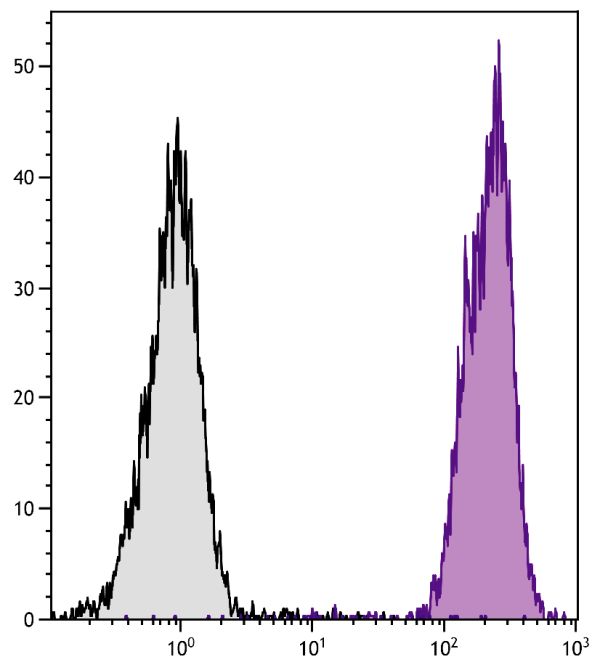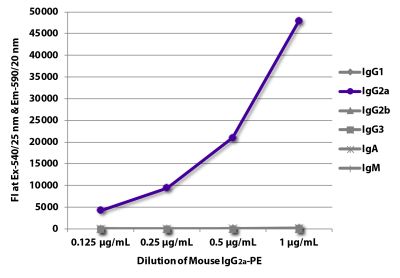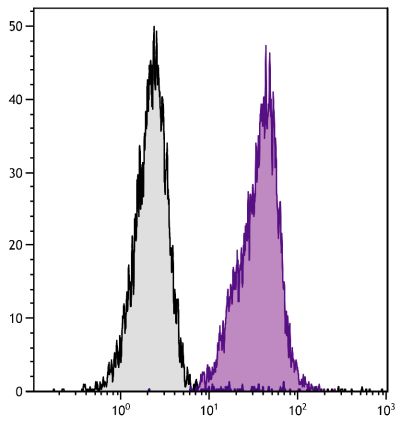Mouse Anti-Mouse H-2Dd-PE (34-5-8S)
Cat. No.:
1912-09
PE Anti-Mouse H-2Dd antibody for use in flow cytometry assays.
$262.00


| Clone | 34-5-8S |
|---|---|
| Isotype | Mouse (C3H/HeJ) IgG2aκ |
| Isotype Control | Mouse IgG2a-PE (HOPC-1) |
| Specificity | Mouse H-2Dd |
| Alternative Names | MHC Class I |
| Description | The monoclonal antibody 34-5-8S reacts with a conformational epitope on H-2Dd MHC Class I found on the N-terminal domains of α1 and α2 chains when complexed with β2-microglobulin. The antibody does not react with H-2Dd α chains synthesized in vitro. Weak cross-reactivity with cells from mice of the H-2b, H-2q, and H-2s haplotypes has been observed by flow cytometric analysis. Reactivity with cells from mice of the H-2f, H-2k, H-2p, and H-2r haplotypes has not been observed. 34-5-8S has been reported to block the recognition of H-2Dd by Ly-49A+, Ly-49C+, and Ly-49G2+ natural killer cells. |
| Immunogen | BDF1 mouse splenocytes |
| Conjugate | PE (R-phycoerythrin) |
| Buffer Formulation | Phosphate buffered saline containing < 0.1% sodium azide and a stabilizer |
| Clonality | Monoclonal |
| Concentration | 0.1 mg/mL |
| Volume | 1.0 mL |
| Recommended Storage | 2-8°C; Avoid exposure to light; Do not freeze |
| Applications |
Flow Cytometry – Quality tested 8 Immunocytochemistry – Reported in literature 8 Immunoprecipitation – Reported in literature 4,5,8 Complement Mediated Cell Depletion – Reported in literature 1 Adhesion – Reported in literature 2,3 Blocking – Reported in literature 2,3 Purification – Reported in literature 2,6 ELISA – Reported in literature 6,7 |
| RRID Number | AB_2795503 |
| Gene ID |
14964 (Mouse) |
| Gene ID Symbol |
H2-D1 (Mouse) |
| Gene ID Aliases | H-2D; H2-D; H2-K1 |
| UniProt ID |
P01900 (Mouse) |
| UniProt Name |
HA12_MOUSE (Mouse) |
Documentation
Certificate of Analysis Lookup
Enter the Catalog Number and Lot Number for the Certificate of Analysis you wish to view
- 1. Ozato K, Mayer NM, Sachs DH. Monoclonal antibodies to mouse major histocompatibility complex antigens. IV. A series of hybridoma clones producing anti-H-2d antibodies and an examination of expression of H-2d antigens on the surface of these cells. Transplantation. 1982;34:113-9. (Immunogen, CMDC)
- 2. Kane KP. Ly-49 mediates EL4 lymphoma adhesion to isolated class I major histocompatibility complex molecules. J Exp Med. 1994;179:1011-5. (Block, Purification, Adhesion)
- 3. Brennan J, Mahon G, Mager DL, Jefferies WA, Takei F. Recognition of class I major histocompatibility complex molecules by Ly-49: specificities and domain interactions. J Exp Med. 1996;183:1553-9. (Block, Adhesion)
- 4. Beck JC, Hansen TH, Cullen SE, Lee DR. Slower processing, weaker β2-M association, and lower surface expression of H-2Ld are influenced by its amino terminus. J Immunol. 1986;137:916-23. (IP)
- 5. Lie W, Myers NB, Connolly JM, Gorka J, Lee DR, Hansen TH. The specific binding of peptide ligand to Ld class I major histocompatibility complex molecules determines their antigenic structure. J Exp Med. 1991;173:449-59. (IP)
- 6. White J, Crawford F, Fremont D, Marrack P, Kappler J. Soluble class I MHC with β2-microglobulin covalently linked peptides: specific binding to a T cell hybridoma. J Immunol. 1999;162:2671-6. (Purification, ELISA)
- 7. Mage MG, Lee Li, Ribaudo RK, Corr M, Kozlowski S, McHugh L, et al. A recombinant, soluble, single-chain class I major histocompatibility complex molecule with biological activity. Proc Natl Acad Sci USA. 1992;89:10658-62. (ELISA)
- 8. Paquet M, Cohen-Doyle M, Shore GC, Williams DB. Bap29/31 influences the intracellular traffic of MHC class I molecules. J Immunol. 2004;172:7548-55. (IP, ICC, FC)
See More





